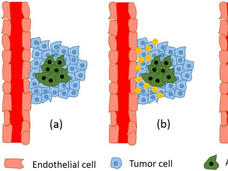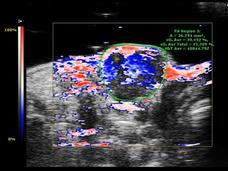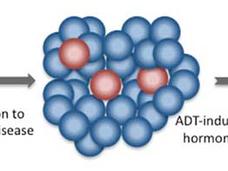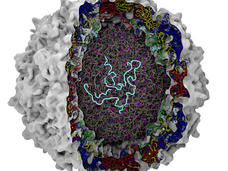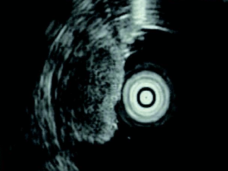Cancer Currents: An NCI Cancer Research Blog
A blog featuring news and research updates from the National Cancer Institute. Learn more about Cancer Currents.
-
New on NCI Websites, March 2018
NCI periodically provides updates on new websites and other online content of interest to the cancer community.
-
Lung Cancer Screening Most Beneficial for Those at Highest Risk, Analysis Suggests
An analysis of data from a demonstration project led by the Veterans Health Administration may help to better define who is most likely to benefit from lung cancer screening.
-
Cabozantinib Approval Expands Initial Treatment Options for Advanced Kidney Cancer
The Food and Drug Administration has approved cabozantinib (Cabometyx®) as an initial treatment for patients with advanced renal cell carcinoma, the most common type of kidney cancer.
-
Molecular Switch Links High-Fat Diet to Prostate Cancer Metastasis
A new study in mice has revealed a molecular link between a high-fat diet and the growth and spread of prostate cancer. The findings, the study leaders believe, raise the possibility that changes in diet could potentially improve treatment outcomes in some men.
-
Can Oxygen “Microbubbles” Make Radiation Therapy More Effective?
A new study in mice raises the possibility that using microscopic, oxygen-carrying bubbles may improve the effectiveness of radiation therapy in the treatment of breast cancer.
-
Retooling NCI MERIT Awards to Support Budding Cancer Researchers
NCI Director Dr. Norman Sharpless discusses how NCI is retooling a grant mechanism, called the MERIT R37 Award, to help early-stage investigators by extending the length of time they can receive funding under their first independent NIH grant.
-
Abiraterone Approved for Earlier Use in Men with Metastatic Prostate Cancer
The Food and Drug Administration (FDA) has expanded the approval of abiraterone (Zytiga®) for men with prostate cancer. The agency approved abiraterone, in combination with the steroid prednisone, for men with metastatic prostate cancer that is responsive to hormone-blocking treatments (also known as castration-sensitive) and is at high risk of progressing.
-
For Rare Melanoma, Checkpoint Inhibitors May Hold Substantial Promise
A new study suggests that patients with a rare form of melanoma, called desmoplastic melanoma, may be particularly likely to benefit from treatments known as immune checkpoint inhibitors. An NCI-sponsored clinical trial is already testing one such drug in patients with this cancer.
-
New Cancer Treatment Approach Targets Circadian Clock
Two compounds that target components of the circadian clock killed several types of cancer cells in the lab and slowed the growth of brain tumors in mice without harming healthy cells, a new study showed.
-
Oncolytic Virus Therapy: Using Tumor-Targeting Viruses to Treat Cancer
A small but growing number of patients with cancer are being treated with oncolytic viruses, which infect and kill tumor cells. But research now suggests that these treatments also work against cancer by spurring an immune response.
-
FDA Approves New Treatment for Certain Neuroendocrine Tumors
People with cancerous neuroendocrine tumors (NETs) that affect the digestive tract now have a new treatment option. On January 29, FDA approved the targeted treatment lutetium Lu 177 dotatate (Lutathera®) for adult patients with advanced NETs that affect the pancreas or gastrointestinal tract.
-
Gut Bacteria Influence Effectiveness of a Type of Immunotherapy
Using mouse models of cancer, researchers found that altering the gut microbiome could affect whether tumors responded to checkpoint inhibition.
-
TARGET Study Finds Major Differences between Childhood and Adult AML
An NCI-funded study has found significant differences in the genetics of acute myeloid leukemia in younger and older patients. The findings could help guide the development of treatments tailored specifically for childhood AML.
-
Olaparib Approved for Treating Some Breast Cancers with BRCA Gene Mutations
The drug olaparib (Lynparza®) is the first treatment approved by the Food and Drug Administration for patients with metastatic breast cancer who have inherited mutations in the BRCA1 or BRCA2 genes.
-
Study Identifies Potential Cause of Hearing Loss from Cisplatin
A new study has found the commonly used chemotherapy drug cisplatin is retained in the inner ear of mice and humans for long periods. The finding may explain why many patients treated with the drug develop hearing loss and could point toward potential ways to prevent it.
-
The Challenging Landscape of Cancer and Aging: Charting a Way Forward
NCI Director Dr. Norman Sharpless discusses research on aging and cancer, including understanding the biology of aging and its relationship to cancer, the treatment of older patients, and ensuring older patients participate in cancer clinical trials.
-
Study Finds Biological Differences in Lung Tumors of African Americans and Whites
Patterns of gene expression may be different in the tumors of some African Americans than in those of whites, a new study has found, and these biological differences may contribute to racial disparities in lung cancer.
-
Nilotinib Can Be Discontinued in Some Patients with Chronic Myelogenous Leukemia
On December 22, FDA approved an update to the label of nilotinib (Tasignia) that states that some patients with CML who are taking nilotinib and whose cancer has been in remission for an extended period can safely stop taking it.
-
Incidence of Cancers of the Lower Stomach Increasing among Younger Americans
A type of cancer that occurs in the lower stomach has been increasing among some Americans under the age of 50, even though in the general population the incidence of all stomach cancers has been declining for decades, according to a new study.
-
Acupuncture May Reduce Treatment-Related Joint Pain for Breast Cancer Patients
Joint pain caused by aromatase inhibitors in postmenopausal women with breast cancer can cause some women to stop taking the drugs. Reducing their symptoms may translate into better adherence to therapy.



